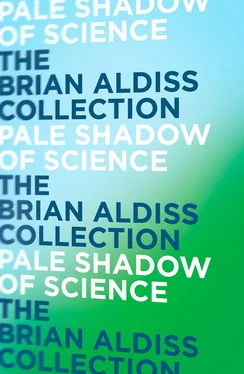The idea of this book is to preserve some of the articles I have written over recent years which may be of more than ephemeral interest. It follows on from my earlier Serconia Press book, The Pale Shadow of Science , and is the mixture as before. Except.
Except that here I include a brief autobiography, presenting it to my readers with some trepidation. Gale Research Books in Detroit have begun a rather astonishing series of volumes, entitled Contemporary Authors – Autobiography Series . Gale sent me a copy of Volume I, asking me if I would write for Volume 2. Writers are allowed to have photographs of their choice to accompany the text. It all looks amateur and artless, but from it a reader can learn a great deal about that ever-mysterious subject, other people’s lives. I decided to have a go at Volume 2.
It is difficult, perhaps impossible, to be truthful about oneself. I did my best. The exercise opened up a new area of writing. Gale limits its writers to a certain number of words. In the greatly revised sketch, here presented as ‘The Glass Forest,’ the thing has grown almost half as long again. My trepidation is, in consequence, almost half as great again.
Incidentally, it is worth anyone’s while looking up the Gale books in their library. The first volume contains autobiographical sketches by Marge Piercy, Richard Condon, Stanislaw Lem, and Frederik Pohl, among other familiar names, the second Poul Anderson, James Gunn, and Alan Sillitoe.
‘The Glass Forest’ is the pièce de resistance on this menu; but I hope that the other courses will also please. As before, science fiction and writing rub shoulders with travel, history, and other arts.
My thanks go as ever to the stalwarts of Serconia Press and to Marshall B. Tymn, President of the International Association for the Fantastic in the Arts, in connection with that august event, the Seventh Conference of the IAFA in Houston, Texas on 12-16 March 1986, which I was privileged to attend as Guest of Honour.
B.W.A.
Preparation for What? Contents Title Page The Pale Shadow of Science BY BRIAN ALDISS Introductory Note Introductory Note to The Lurid Glare of the Comet Preparation for What? Long Cut to Burma Old Bessie Science Fiction’s Mother Figure The Immanent Will Returns The Downward Journey: Orwell’s 1984 A Whole New Can of Worms Peep A Transatlantic Harrison, Yippee! The Atheist’s Tragedy Revisited The Pale Shadow of Science A Monster for All Seasons Helliconia: How and Why Bold Towers, Shadowed Streets … … And the Lurid Glare of the Comet When the Future Had to Stop What Happens Next? Grounded in Stellar Art It Takes Two to Tango Robert Sheckley’s World: Australia Sturgeon: Mercury Plus X The Glass Forest About the Author Also available by the author Also part of The Brian Aldiss Collection Copyright Конец ознакомительного фрагмента. Текст предоставлен ООО «ЛитРес». Прочитайте эту книгу целиком, купив полную легальную версию на ЛитРес. Безопасно оплатить книгу можно банковской картой Visa, MasterCard, Maestro, со счета мобильного телефона, с платежного терминала, в салоне МТС или Связной, через PayPal, WebMoney, Яндекс.Деньги, QIWI Кошелек, бонусными картами или другим удобным Вам способом. About the Publisher
There should have been a law against the preparatory school I went to. Later, there was a law, and places like St Paul’s Court no longer exist. In the thirties, there must have been many of them dotting the country, little plague spots of pretention and ignorance.
I was sent there at the age of eight.
‘Be brave,’ my mother said. It was easier to be brave the first term than succeeding terms, when one knew what one was in for.
At the best of times, St Paul’s managed twenty pupils, twelve of whom were boarders. It was the headmaster’s resolve to turn us into gentlemen: that much was clearly stated in the brochure. Of course we all turned into scoundrels. The parents were mainly tradesmen in a modest way of business who wanted their sons to grow up to despise them.
My father was irked to discover, after a year or two, that he was the only parent who was paying the full fees demanded in the brochure. I kept this revelation secret, knowing that the boys – whose sense could not be entirely beaten out of them – would despise him if they found out.
St Paul’s was a large brick building which stood out starkly against the flat Norfolk coastline. Beach and sea lay just outside the back gate. The house was surrounded with sharp shingle, as if it had been caught by a high tide. To one side lay a large games field. In one corner of this field, behind a line of old apple trees, boarders were allowed to keep little gardens. One thing at least I learned to love at St Paul’s: gardening. It was almost a necessity.
The food was abominable. Meat was delivered in a van by Roy’s of Wroxham. To us little exiles, the van was a messenger from a happier world, for Wroxham was where one went to get boats to sail on the Broads. But the headmaster ordered the cheapest cuts, and our opinion of Roy’s became low as a result.
Most of the cooking was done by the headmaster himself. His name was Mr Fangby. He was a smoothly porcine man with a thin nose and thinning hair swept and stuck back over a domelike head. I never really disliked him for much of the time, though it is hard to say why. His wife looked after their child and, when meals were over, Mr Fangby could be seen doing the washing-up and dolorously drying the dishes on an old baby’s napkin.
Breakfast was the worst meal. The rule at St Paul’s was that plates had to be cleared. It was that rule, rather than the cooking, which made it possible to claim that the food was edible. The porridge was an impossible paste. One other boy and I often remained after the others had gone, getting the paste down spoonful by spoonful, with occasional bolts to the lavatory to vomit.
I took some tiny sweets back with me the next term. By concealing one in my mouth before we filed into the dining room, I used its flavour to camouflage the taste of the porridge. This ruse worked well for some weeks. But our enemy, the bootboy, who helped Fangby with breakfast, detected the sweet; I was in trouble, and my tuck was confiscated.
We were always hungry. Fangby was a lazy man, and the worst news of all was when he felt too lazy to take lessons. Then he would enter the dining room at breakfast time, all smiles, and announce a day’s holiday for good work. The news spelt starvation and boredom.
Out in the field we had to go. We were not allowed back into the house all day. Sometimes it would be eight o’clock or even later before either Fangby or his only master, Noland, came to tell us to get inside quietly and go to our dormitory.
During those long days, we would be visited twice, either by the hated bootboy or by Mrs Fangby. At lunch time, they would bring out a big toffee tin containing meat and lettuce sandwiches. At tea time, they would bring a tray with mugs of tea and perhaps buns. That was our day’s food. The meat in the sandwiches was inedible.
We cultivated our gardens, although we had never heard of Voltaire’s advice. It was possible in spring to take our pocket-money to a small shop just down the road from the school. Since the Victorian Age lingered in Norfolk until World War II, the shop was run by a lady in black called Miss Abigail. From Miss Abigail, penny packets of Carter’s seeds could be bought.
Читать дальше










